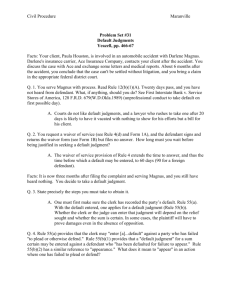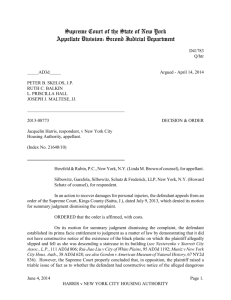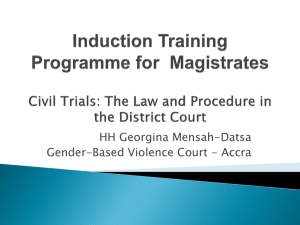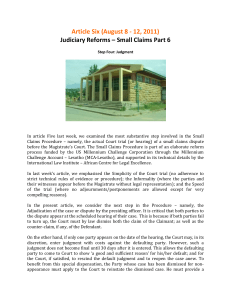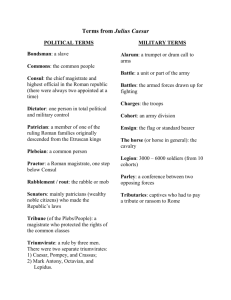small claims: information & instructions
advertisement
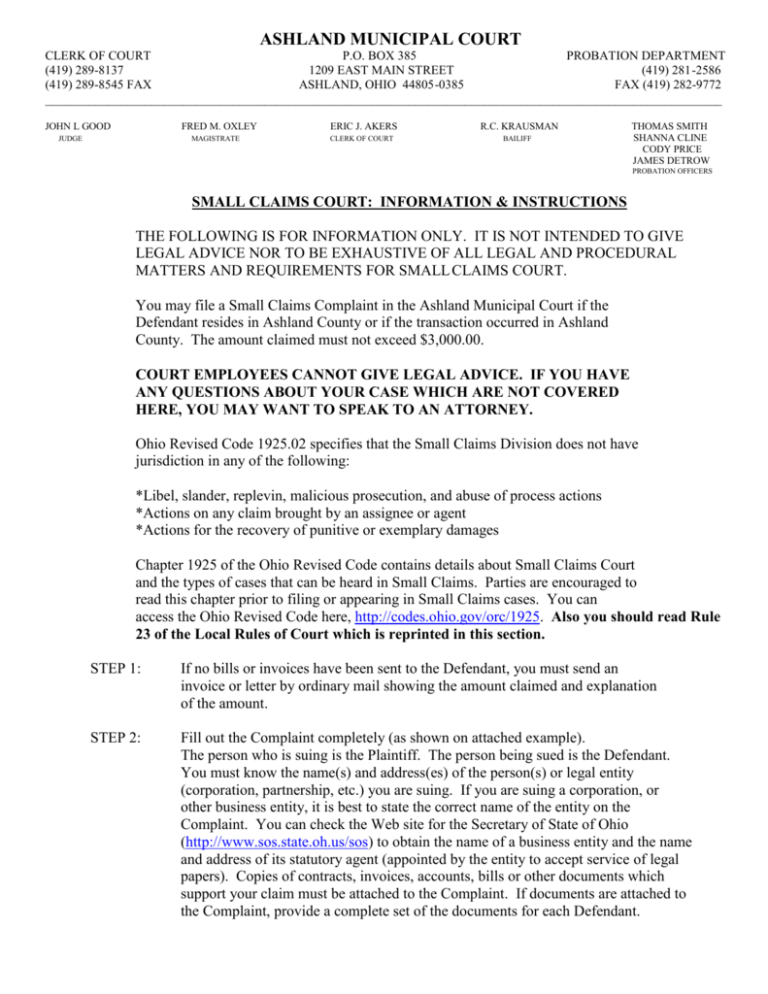
ASHLAND MUNICIPAL COURT CLERK OF COURT P.O. BOX 385 PROBATION DEPARTMENT (419) 289-8137 1209 EAST MAIN STREET (419) 281-2586 (419) 289-8545 FAX ASHLAND, OHIO 44805-0385 FAX (419) 282-9772 ____________________________________________________________________________________________________________ JOHN L GOOD FRED M. OXLEY JUDGE MAGISTRATE ERIC J. AKERS R.C. KRAUSMAN CLERK OF COURT BAILIFF THOMAS SMITH SHANNA CLINE CODY PRICE JAMES DETROW PROBATION OFFICERS SMALL CLAIMS COURT: INFORMATION & INSTRUCTIONS THE FOLLOWING IS FOR INFORMATION ONLY. IT IS NOT INTENDED TO GIVE LEGAL ADVICE NOR TO BE EXHAUSTIVE OF ALL LEGAL AND PROCEDURAL MATTERS AND REQUIREMENTS FOR SMALL CLAIMS COURT. You may file a Small Claims Complaint in the Ashland Municipal Court if the Defendant resides in Ashland County or if the transaction occurred in Ashland County. The amount claimed must not exceed $3,000.00. COURT EMPLOYEES CANNOT GIVE LEGAL ADVICE. IF YOU HAVE ANY QUESTIONS ABOUT YOUR CASE WHICH ARE NOT COVERED HERE, YOU MAY WANT TO SPEAK TO AN ATTORNEY. Ohio Revised Code 1925.02 specifies that the Small Claims Division does not have jurisdiction in any of the following: *Libel, slander, replevin, malicious prosecution, and abuse of process actions *Actions on any claim brought by an assignee or agent *Actions for the recovery of punitive or exemplary damages Chapter 1925 of the Ohio Revised Code contains details about Small Claims Court and the types of cases that can be heard in Small Claims. Parties are encouraged to read this chapter prior to filing or appearing in Small Claims cases. You can access the Ohio Revised Code here, http://codes.ohio.gov/orc/1925. Also you should read Rule 23 of the Local Rules of Court which is reprinted in this section. STEP 1: If no bills or invoices have been sent to the Defendant, you must send an invoice or letter by ordinary mail showing the amount claimed and explanation of the amount. STEP 2: Fill out the Complaint completely (as shown on attached example). The person who is suing is the Plaintiff. The person being sued is the Defendant. You must know the name(s) and address(es) of the person(s) or legal entity (corporation, partnership, etc.) you are suing. If you are suing a corporation, or other business entity, it is best to state the correct name of the entity on the Complaint. You can check the Web site for the Secretary of State of Ohio (http://www.sos.state.oh.us/sos) to obtain the name of a business entity and the name and address of its statutory agent (appointed by the entity to accept service of legal papers). Copies of contracts, invoices, accounts, bills or other documents which support your claim must be attached to the Complaint. If documents are attached to the Complaint, provide a complete set of the documents for each Defendant. STEP 3: Have your signature on the Complaint notarized (or sworn to at Municipal Court). STEP 4: Attach copies of the contracts, invoices, accounts or other documents to support your claim as follows: 1 copy for the Ashland Municipal Court 1 copy for EACH Defendant named in the Complaint. STEP 5: Bring or mail the Complaint and attachments, plus the $50.00 filing fee to the Ashland Municipal Court, Small Claims Division (an additional $20.00 fee is charged for each Defendant in excess of one) STEP 6: The Court will issue a Summons on Complaint and mail it and a copy of the Complaint to the Defendant. You will receive a copy of the Complaint. You and the other party(ies) will receive a Memorandum and Notice of the Court dates which will tell you of the dates you should be in Court. If either party wishes to change the date for the pretrial/conciliation, he/she/it must notify the Court upon receiving the Notice of Court dates. The trial date can be changed at the pretrial/conciliation only by agreement of the parties and approval of the Court. The Court will set the matter for a pretrial/conciliation hearing for a date prior to the trial date and will attempt to get the matter resolved without a trial. Even if the Defendant does not appear at the pretrial/conciliation, in order to obtain a judgment against him/her/it you must attend. If you fail to appear and the Defendant does appear, the Defendant could have the case dismissed. If you appear and the Defendant does not, you may be granted a judgment by default. STEP 7: AGREED SETTLEMENT: If the Defendant wishes to pay, we prefer to have him/her/it pay you directly, and you are entitled to recover the Court costs you have paid. Notify the Court immediately if the Defendant pays you. If the Defendant wishes to make payment arrangements or terms, it is best to have him/her/it appear at the Court hearing to obtain an Agreed Judgment and then have him/her/it sign a deferred payment agreement. If he/she/it does not comply with the agreement, you can proceed with further action. STEP 8: CONCILIATION AND TRIAL: The pretrial/conciliation hearing and the trial are conducted by the Magistrate. At the pretrial/conciliation hearing the parties with the assistance of the Magistrate, will discuss a settlement. If it is not settled, the case will be tried to the Magistrate on the date scheduled. The trial is the only chance the Plaintiff and the Defendant will have to present their witnesses, documents, and any other evidence that will help them prove their case. The Magistrate will not allow either side to provide additional evidence at a later time. STEP 9: MAGISTRATE’S DECISION: If the matter proceeds to a trial, after considering the facts and the law, the Magistrate will issue a written Magistrate’s Decision, which will be sent to the Plaintiff and Defendant. If you wish to have the Magistrate or Court make findings of fact and conclusions of law you must request that it do so before entry of the Magistrate’s Decision or within seven days after it has been filed. The Magistrate or Court may require you to prepare and submit proposed findings of fact and conclusions of law. If you wish to file objections, you must review that Decision carefully for the procedure to file objections. STEP 10: OBJECTIONS: Either party has a right to object to the Magistrate’s Decision. Written Objections must be filed within fourteen (14) days of the time-stamped date of the Magistrate’s Decision, a copy must be sent by the objecting party to the other side, and the objection must state on it that a copy was sent to the other side. If one party files objections, the other party may file objections within ten (10) days of filing those objections. There is a filing fee. A new trial will NOT be scheduled before the Judge. If you object to findings of fact you must file a transcript of the proceedings, or if not available, an affidavit regarding those facts (see Magistrate’s Decision). STEP 11: FINAL JUDGMENT: The Judge thoroughly reviews the file, the Magistrate’s Decision, any written objections, and any response to objections before issuing a final Judgment Entry in the case. The Judgment Entry may adopt or modify the Magistrate’s Decision, or it may be entirely different from the Magistrate’s Decision. STEP 12: APPEAL OF FINAL JUDGMENT: The final judgment made by the Judge can be appealed to the Court of Appeals. This is a technical procedure that must be done shortly after the final Judgment Entry is issued. It will probably require the services of an attorney. Please see the notice which follows the Magistrate’s Decision. STEP 13: VEHICLE COMPLAINTS: If your Complaint has to do with a motor vehicle, you probably want to bring the original title or a certified copy of it with you to the trial. STEP 14: IF YOU OBTAIN A JUDGMENT: If you obtain a judgment against the opposing party, and the party does not pay you the judgment amount, court costs, and interest after the judgment is rendered, you will have to take affirmative steps to collect the judgment. The most common methods used are wage garnishments, bank account attachments, execution on personal property, and filing a lien on real property owned by the Defendant. The forms for these procedures are available from the Small Claims Division of the Clerk’s office. If the Plaintiff is a corporation, these methods of collection must be handled by an attorney on behalf of the corporation. STEP 15: GETTING INFORMATION TO COLLECT A JUDGMENT: If the judgment is at least 30 days old and you want to take steps to collect your judgment, but you don’t know the necessary information (i.e. where the Defendant works, where he banks, etc.), you can request a Financial Information Order from the Small Claims Division of the Clerk’s office. Plaintiff corporations are permitted to request a financial information form without being represented by an attorney. A form will be sent to the party who owes the Judgment. He/she must complete the form and return it to the Court. There is a filing fee. Once the form is completed and returned to the Court, the Clerk’s office will mail a copy of it to you. The information on the form should be useful to you in collecting your judgment. If the Defendant does not file the form timely, you will receive copies of notices that the Court sends to the Defendant. You may not need to appear for some of these post-judgment hearings, so read your notice carefully. SMALL CLAIMS COURT CAN ONLY RENDER JUDGMENT FOR YOU. AFTER JUDGMENT IT WILL BE UP TO YOU TO COLLECT THE MONEY OWED YOU. WE DO HAVE FORMS TO ASSIST YOU. IF YOU HAVE LEGAL QUESTIONS YOU WILL NEED TO CONTACT ANA TTORNEY. When the Complaint is being filed by the person dba or a sole proprietorship – the owner of the business must be the one signing the Complaint and appearing at the hearing or they may have an attorney represent them. (The Complaint can be signed and notarized prior to filing with the Court). In Post Judgment hearings a representative of the business may appear, as the Magistrate will be conducting these hearings. IN ACCORDANCE WITH OHIO RULES OF CIVIL PROCEDURE THE COURT REQUIRES THE FOLLOWING RULE BE FOLLOWED BY CORPORATIONS FILING SMALL CLAIMS: §1925.17 Corporations, presentation of claims or defense: A corporation, which is a real party in interest in any action in a small claims division may commence such an action and appear therein through an attorney at law. Such a corporation may, through any bona fide officer or salaried employee, file and present its claim or defense in any action in a small claims division arising from a claim based on a contract to which the corporation is an original party or any other claim to which the corporation is an original claimant; provided such corporation does not, in the absence of representation by an attorney at law, engage in cross examination, argument, or other acts of advocacy.

